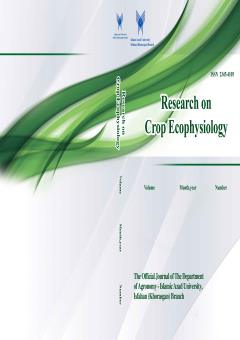Effects of Different Levels of Proline Amino Acid on Yield and Related-Yield of Wheat
Subject Areas : Research On Crop EcophysiologySeyed Ali Emami 1 , Ali Soleymani 2
1 -
2 -
Keywords: Keywords: Foliar application, Proline, Yield components, Wheat yield,
Abstract :
Effects of Different Levels of Proline Amino Acid on Yield and Related-Yield of Wheat SAYED ALI EMAMI1*, ALI SOLEYMANI2 1-PhD Student of Islamic Azad University of Khorasgan, Iran. 2- Deprtment of Agronomy and Plant Breeding, Institute of Agriculture, Water, Food and Nutraceuticals, Isf. C., Islamic Azad University, Isfahan, Iran. *Corresponding author’s E-mail: dr.s.a.emami110@gmail.com Received: 25 April 2025 Accepted: 18 June 2025 ABSTRACT Proline, as an essential amino acid, contributes to the structure of proteins while also acting as an osmoprotectant during periods of environmental stress. Wheat stands as an essential agricultural crop that plays a vital role in ensuring global food security. This research explores the influence of foliar spraying with the amino acid proline at two specific concentrations, 45% and 75%, across two successive growing seasons (2016-2018) at an experimental farm in Barsian village, Ziar, using the wheat cultivar M7318. The aim is to assess how these concentrations affect various yield and grain-related attributes, such as total grain yield, 1000-grain weight, grain weight per individual plant, grain weight per spike, seed count per square meter, and seed count per spike. Also, the study seeks to determine the varying impacts of these proline levels on wheat performance and productivity over the observed period. The results demonstrated a dose-dependent improvement in all measured parameters, with the 75% proline treatment inducing the most significant enhancements. Findings included an increase in all traits compared to the 45%. These improvements stem from proline's dual function as an osmoprotectant and metabolic enhancer, supporting photosynthesis and nitrogen assimilation during grain filling. The 75% proline application resulted in a remarkable yield, highlighting its potential as an effective biostimulant. Revealed strong positive correlations between grain yield and critical yield components, including grain weight per spike and number of seeds per spike, confirming proline's role in improving reproductive efficiency. The study concludes that 75% proline foliar application significantly enhances wheat yield through integrated physiological, agronomic, and molecular mechanisms, offering a sustainable strategy for cereal production.
REFERENCES
Albahri G., Alyamani A. A., Badran A., Hijazi A., Nasser M., Maresca M., Baydoun E. 2023. Enhancing essential grains yield for sustainable food security and bio-safe agriculture through latest innovative approaches. Agronomy, 13(7), 1709.
Asghar N., Akram N. A., Ameer A., Shahid H., Kausar S., Asghar A., Jahangir I. 2021. Foliar-applied hydrogen peroxide and proline modulates growth, yield and biochemical attributes of wheat (Triticum aestivum L.) Under varied n and p levels. Fresenenius Environmental Bulletin, 30(5), 5445-5465.
Ashraf M. F. M. R., Foolad M. R. 2007. Roles of glycine betaine and proline in improving plant abiotic stress resistance. Environmental and experimental botany, 59(2), 206-216.
Iqbal S., Wang X., Mubeen I., Kamran M., Kanwal I., Díaz G. A., Abbas A., Parveen A., Atiq M.N., Alshaya H. Zin El-Abedin T.K. 2022. Phytohormones trigger drought tolerance in crop plants: outlook and future perspectives. Frontiers in Plant Science, 12, 799318.
Ghosh U. K., Islam M. N., Siddiqui M. N., Cao X., Khan M. A. R. 2022. Proline, a multifaceted signalling molecule in plant responses to abiotic stress: understanding the physiological mechanisms. Plant Biology, 24(2), 227-239.
Gupta O.P., Singh A., Pandey V., Sendhil R., Khan M.K., Pandey A., Kumar S., Hamurcu M., Ram S. Singh G., 2024. Critical assessment of wheat biofortification for iron and zinc: a comprehensive review of conceptualization, trends, approaches, bioavailability, health impact, and policy framework. Frontiers in Nutrition, 10, p. 1310020.
Hafeez A., Ali B., Javed M.A., Saleem A., Fatima M., Fathi A., Afridi M.S., Aydin V., Oral M.A. Soudy, F.A., 2023. Plant breeding for harmony between sustainable agriculture, the environment, and global food security: an era of genomics assisted breeding. Planta, 258(5), p.97.
Haider I., Raza M. A. S., Iqbal R., Ahmad S., Aslam M. U., Israr M., Riaz U., Sarfraz M., Abbas N., Abbasi S.H. Abbas Z. 2021. Alleviating the Drought Stress in Wheat (Triticum aestivum L.) by Foliar Application of Amino Acid and Yeast. Pakistan Journal of Agricultural Research, 34(1).
Hayat S., Hayat Q., Alyemeni M. N., Wani A. S., Pichtel J., Ahmad A. 2012. Role of proline under changing environments: a review. Plant signaling & behavior, 7(11), 1456-1466.
Hosseinifard M., Stefaniak S., Ghorbani Javid M., Soltani E., Wojtyla Ł., Garnczarska M. 2022. Contribution of exogenous proline to abiotic stresses tolerance in plants: a review. International Journal of Molecular Sciences, 23(9), 5186.
Ramazanova R., Tanirbergenov S., Sharypova T., Zhumagulova M., Suleimenova A., Poshanov M., Malawska M. S. 2024. Foliar Fertilization with Organic-Mineral Compounds: A Sustainable Approach to Enhancing Winter Wheat Yields on Low-Fertility Soils.
Raza A., Charagh S., Abbas S., Hassan M.U., Saeed F., Haider S., Sharif R., Anand A., Corpas F.J., Jin W. Varshney R.K., 2023. Assessment of proline function in higher plants under extreme temperatures. Plant Biology, 25(3), pp.379-395.
Sabar M., Mustafa S. E., Ijaz M., Khan R. A. R., Shahzadi F., Saher H., Sabir A. M. 2024. Rice breeding for yield improvement through traditional and modern genetic tools. European Journal of Ecology, Biology and Agriculture, 1(1), 14-19.
Shewry P.R. Hey S.J., 2015. The contribution of wheat to human diet and health. Food and Energy Security, 4(3), pp. 178-202.
Szabados L., Savouré A. 2010. Proline: a multifunctional amino acid. Trends in plant science, 15(2), 89-97.
Trovato M., Funck D., Forlani G., Okumoto S., Amir R. 2021. Amino acids in plants: Regulation and functions in development and stress defense. Frontiers in plant science, 12, 772810.
Verbruggen N., Hermans C. 2008. Proline accumulation in plants: a review. Amino acids, 35(4), 753-759.
Wang J., Qiu Y., Zhang X., Zhou Z., Han X., Zhou Y., Qin L., Liu K., Li S., Wang W. Chen Y., 2023. Increasing basal nitrogen fertilizer rate improves grain yield, quality and 2-acetyl-1-pyrroline in rice under wheat straw returning. Frontiers in Plant Science, 13, 1099751.


